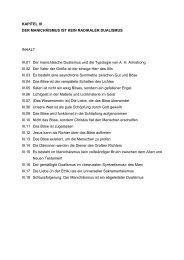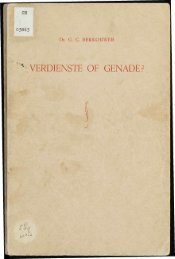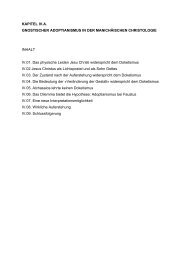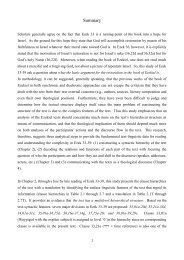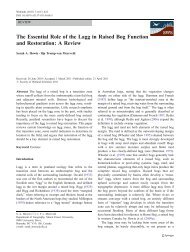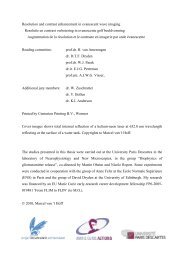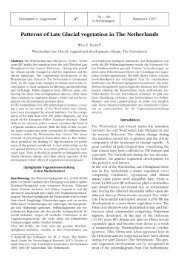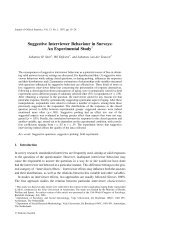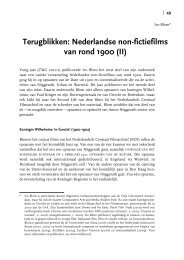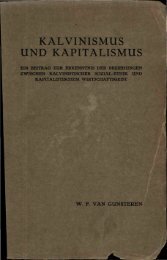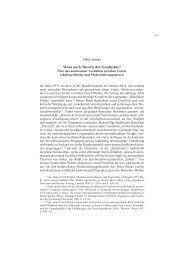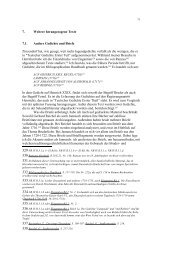woorden, waarden en de evolutie van gedrag - VU-DARE Home
woorden, waarden en de evolutie van gedrag - VU-DARE Home
woorden, waarden en de evolutie van gedrag - VU-DARE Home
You also want an ePaper? Increase the reach of your titles
YUMPU automatically turns print PDFs into web optimized ePapers that Google loves.
Evolutiebiolog<strong>en</strong> zijn het er zon<strong>de</strong>r uitzon<strong>de</strong>ring over e<strong>en</strong>s<br />
dat omgeving belangrijk is, <strong>en</strong> het meest formeel uitgewerkte<br />
<strong>de</strong>el <strong>van</strong> hun theorie, <strong>de</strong> populatieg<strong>en</strong>etica, gaat daar ook<br />
steeds over. Maar daarbij gaat het om omgeving in e<strong>en</strong><br />
beperkte zin, <strong>en</strong> die krijgt dan ook nog e<strong>en</strong> beperkte rol.<br />
Volg<strong>en</strong>s Sober * zou e<strong>en</strong> volledige populatieg<strong>en</strong>etica uit vier<br />
theorieën (sam<strong>en</strong>hang<strong>en</strong><strong>de</strong> verzameling<strong>en</strong> <strong>van</strong> wett<strong>en</strong>)<br />
moet<strong>en</strong> bestaan. De eerste theorie (ruwweg <strong>de</strong> ontwikkelingsbiologie)<br />
beschrijft hoe e<strong>en</strong> bevruchte eicel met e<strong>en</strong> bepaald<br />
g<strong>en</strong>otype zich in e<strong>en</strong> bepaal<strong>de</strong> omgeving ontwikkelt tot e<strong>en</strong><br />
compleet individu met e<strong>en</strong> eig<strong>en</strong> f<strong>en</strong>otype. Populaties,<br />
groep<strong>en</strong> <strong>van</strong> zulke individu<strong>en</strong>, veran<strong>de</strong>r<strong>en</strong> <strong>van</strong> sam<strong>en</strong>stelling<br />
door verschill<strong>en</strong> in overlevingskans<strong>en</strong> <strong>van</strong> individu<strong>en</strong>, door<br />
migratie, <strong>en</strong> door an<strong>de</strong>re evolutionaire kracht<strong>en</strong>. De twee<strong>de</strong><br />
theorie beschrijft hoe dat in z’n werk gaat. De volg<strong>en</strong><strong>de</strong> stap<br />
in <strong>de</strong> populatieg<strong>en</strong>etische cyclus is <strong>de</strong> aanmaak <strong>van</strong> e<strong>en</strong><br />
* ‘Fertilized eggs <strong>de</strong>velop into organisms with differ<strong>en</strong>t ph<strong>en</strong>otypes.<br />
Laws of <strong>de</strong>velopm<strong>en</strong>tal g<strong>en</strong>etics <strong>de</strong>scribe how a fertilized egg with a<br />
giv<strong>en</strong> g<strong>en</strong>otype will produce differ<strong>en</strong>t ph<strong>en</strong>otypes, <strong>de</strong>p<strong>en</strong>ding on the<br />
<strong>en</strong>vironm<strong>en</strong>t in which it <strong>de</strong>velops. Here g<strong>en</strong>otypic properties are<br />
mapped onto ph<strong>en</strong>otypic ones by the laws T1. Giv<strong>en</strong> an array of<br />
organisms in a g<strong>en</strong>eration, let us say all at the juv<strong>en</strong>ile stage, natural<br />
selection and other evolutionary forces may modify the composition of<br />
that g<strong>en</strong>eration as it matures to the adult stage. This transition is<br />
<strong>de</strong>scribed by laws (T2) that map ph<strong>en</strong>otypic <strong>de</strong>scriptions onto other<br />
ph<strong>en</strong>otypic <strong>de</strong>scriptions. The adults th<strong>en</strong> create gametes that th<strong>en</strong> join<br />
to form fertilized eggs. Again selection may play a role, this time in<br />
producing differ<strong>en</strong>ces in reproductive success. Ph<strong>en</strong>otypic properties<br />
of par<strong>en</strong>ts may thereby affect the g<strong>en</strong>etic composition of the gamete<br />
pool from which the next g<strong>en</strong>eration of zygotes will be constructed.<br />
Here, the requisite laws of transformation T3 move from the<br />
ph<strong>en</strong>otypic to the g<strong>en</strong>otypic level. The composition of gametes to form<br />
zygotes is <strong>de</strong>scribed at the g<strong>en</strong>etic level by a set of principles (T4) that<br />
inclu<strong>de</strong>s the Hardy-Weinberg law, and we are off and running again<br />
with a new g<strong>en</strong>eration of fertilized eggs’ (Sober 1984: 37. Sober baseert<br />
zich hier vooral op Lewontin 1974: 12-13). Om het verhaal niet<br />
no<strong>de</strong>loos ingewikkeld te mak<strong>en</strong> heb ik bij mijn weergave in <strong>de</strong><br />
hoofdtekst <strong>de</strong> verwijzing naar wett<strong>en</strong> <strong>en</strong> naar f<strong>en</strong>otypische <strong>en</strong><br />
g<strong>en</strong>otypische ruimtes weggelat<strong>en</strong>.<br />
57



